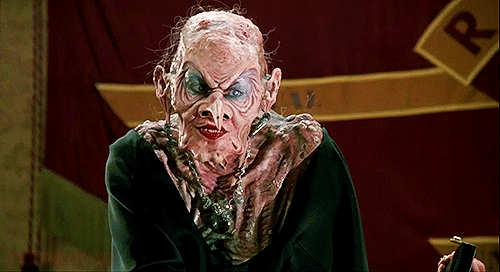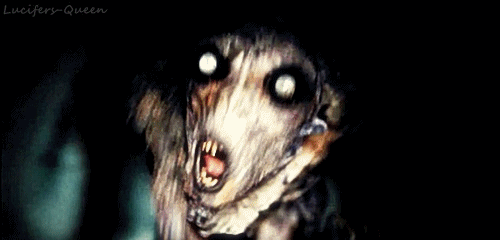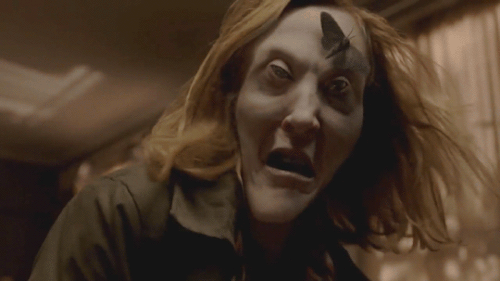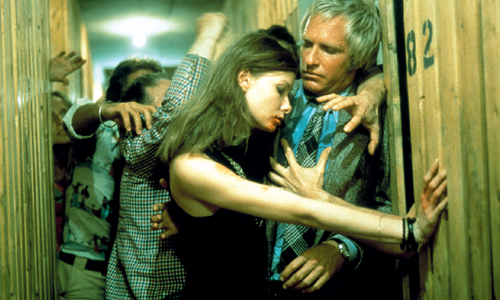Running hot and cold…
-
The Shining (1980): 8/10
-
Carrie (1976): 10/10
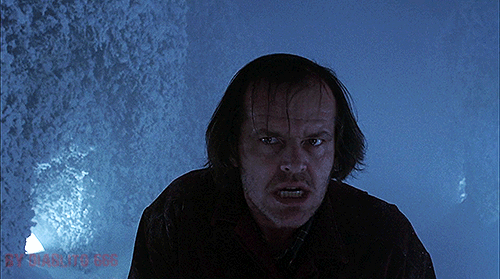
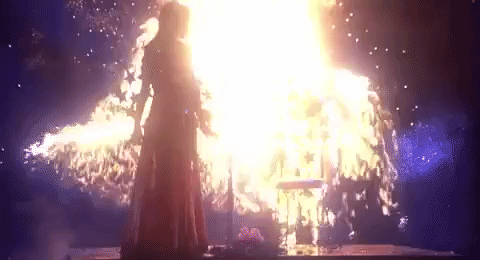
A pair of gifted auteurs adapt the early work of horror author Stephen King, and despite sharing similarly luxe surface pleasures, both films are as far apart in emotional temperature as…well, fire and ice. The latter is represented by Stanley Kubrick’s chilly take on
The Shining, the tale of a former alcoholic, Jack Torrance (Jack Nicholson), who takes on the responsibility of being the winter caretaker of the scenic, remote Colorado hotel the Overlook as it shuts down for the season. For the winter months, he’ll be snowbound there with his wife Wendy (Shelley Duvall) and their five-year-old son, Danny (Danny Lloyd) as he uses the solitude as an excuse to exorcise some personal demons and get a leg up on a new writing project he hopes to kick-start a literary career and turn his life around. But the family unit discovers that the empty, seemingly endless rooms and corridors are also home to restless spirits, ones that wish to glom onto little Danny’s “Shine” (a latest psychic gift that allows him to see traumatic events from the future or past and hear the thoughts of others inside his head as clearly as his own), using his father’s weakened, broken emotional state to bend him to their will, driving Jack over the edge into murderous psychosis.
Kubrick remains one of the greatest filmmakers of all time, a gifted visual stylist (and the new UHD has a spectacular transfer that is, in the very essence of the word, "shining")…yet he fails to probe the wounded psychological depths of King’s source material (one of the finest novels he ever penned). The book gets us into Jack Torrance’s headspace, showing a fundamentally decent man’s sanity being slowly eroded by the caustic effects of drink and the spirits that exploit that weakness to drive the already-resentful man into a full-blown killer, but Kubrick’s film remains stubbornly on the surface. The key mistake was allowing Jack Nicholson to go so wildly over-the-top in his portrayal of Torrance’s inner torments. This was the specific movie where Nicholson – one of the greatest actors of the 1970’s – went Full Jack, arching his wiggy eyebrows with audience-pleasing relish and attacking each line with an arch, spiteful venom that’s tremendously
entertaining to watch, but turns his character into a one-note cartoon. Lost is Torrance’s gradual loss of identity and decency over the course of a season, here instead we get Nicholson hamming it up with method-actor furor that rarely suggests his inner turmoil. Oh to be, the film’s surface pleasures are
very pleasurable…
The Shining is one of the best-looking horror films ever made, and the clammy, antiseptic sheen of the visuals and the disorienting soundtrack choices make for an experience that is constantly eerie and unnerving. Yet I’ve never been able to penetrate the film to the level that Kubrick cultists have and proclaim it one of the best scary movies ever. “Sacrilege” as it might be to admit, Mike Flanagan did a better job yoking Kubrick’s technical acumen with the beating heart of King’s text in last year’s belated sequel,
Doctor Sleep.
The Shining is an “iconic” film that’s never less than fascinating to watch, but, as King once put it, is akin to “A big, beautiful Cadillac with no engine inside it”.
On the other side of the coin in Brian De Palma’s adaptation of King’s first published novel,
Carrie. The story of another child with a psychic gift, this time high school student Carrie White (Sissy Spacek), whose latent telekinetic abilities become enhanced with the onset of her first period…one that, mortifyingly, coincides with a post-gym class shower. Her disgusted classmates – who have always treated the shy, awkward Carrie as the school punching bag -- treat her horrified reaction to her first menstrual cycle as a joke, pelting her with sanitary napkins and cruel cries to “Plug it up!!!” Her religious harridan of a mother, Margaret (Piper Laurie), has a more violent reaction, equating her daughter’s becoming a woman with filthy, sinful disgrace. But when Carrie’s chagrined classmate, Sue Snell (Amy Irving) tries to atone for her shameful treatment of her by cajoling her boyfriend, Tommy Ross (poofy-haired William Katt), to ask Carrie to the prom, she sets the first link in a chain of events that will lead to a ghoulish “prank” that will spark off an orgy of violence and tragedy.
De Palma, like Kubrick, is a filmmaker in love with sleek, gorgeous surfaces, and his film – as always indebted to the techniques of Alfred Hitchcock – is a machine-tooled exercise in inexorable suspense, a quite literal sword of Damocles hanging over the characters until it must, inevitably, fall. And yet he digs into the masochistic woe of King’s text in a manner that Kubrick, for all his icy, cerebral brilliance, could not. Both Sissy Spacek and Piper Laurie received accolades rarely bestowed upon a lowly genre like the horror movies…Oscar nominations for Best Actress and Supporting Actress. And both performers plays their roles brilliantly. Spacek makes poor, downtrodden Carrie into a figure that anyone who went through a self-loathing period in their formative teen years – no matter one’s gender, race or sexual orientation – will relate to with a deep well of empathy. And Laurie shoots the works in a grand guignol turn as Carrie’s mother, Margaret, a looming parental figure at once frightening, pitiable, and darkly funny. The scenes the two actresses share have a pungent theatrical flavor, and this, more than De Palma’s sinuous camerawork or Pino Donaggio’s haunting lullaby of a score, is what gives the film its operatic grandeur. Not just a great horror film, or a great high school film…
Carrie is great CINEMA, full-stop, and is the rare “scary movie” that can movie the viewer to tears and easily as it can scare them silly. A number of wan sequels and remakes have reared their ugly heads over the last 20+ years, but De Palma’s film still burns with emotion, passion and spry filmmaking that hasn’t lost its ability to wound the viewer.
